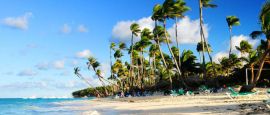Dominican Republic Weather, climate and geography
Weather & climate
The climate in Dominican Republic is generally hot with tropical temperatures all year, although it does vary from region to region.
In Santo Domingo, the temperatures are constant throughout the year, ranging between 25°C (77°F) and 28°C (82°F) while rain falls abundantly from May to November.
The resort town Punta Cana on the east coast is extremely popular with European and American tourists from December to March who seek to escape the cold in the northern hemisphere. In January, the average high in Punta Cana is 29°C (84°F) while the average low is 21°C (70°F). Precipitation is high from June to November, with a risk of hurricanes too. April is the shoulder season, meaning good weather (27°C/81°F) and fewer crowds.
If you're visiting the mountainous interior, it's best to pack a light sweater as it can get very cold at high elevations.
Geography
The Dominican Republic shares the Caribbean island of Hispaniola with the nation of Haiti. It is larger than its French-speaking neighbour, occupying two-thirds of the landmass.
A series of mountain belts stretch across the border region, most notably in the form of the Cordillera Central; at 3,175m (10,414ft) the peak of Pico Duarte represents the highest point of the country.
The Dominican landscape is frequently forested and often undulating, with a multitude of valleys, plains and plateaux. The soil is fertile with excellent white beaches on the north, southeast and east coasts. Ten per cent of the country was set aside in the 1970s to be protected as national parks and science reserves, and, in spite of occasional hurricanes and fires, these areas remain largely intact. Today there are 17 national parks in the Dominican Republic.
Capital city Santo Domingo sits on the south coast (providing a popular stop-off for cruise ships), while the country's second largest city, Santiago, is located in the central northwest region.
The Reserva Cientifica Banco de Plata is an underwater park located off the north coast, set up to preserve a breeding ground for the thousands of humpback whales that visit each winter.
Do you have any Feedback about this page?
© 2026 Columbus Travel Media Ltd. All rights reserved. No part of this site may be reproduced without our written permission, click here for information on Columbus Content Solutions.




 You know where
You know where